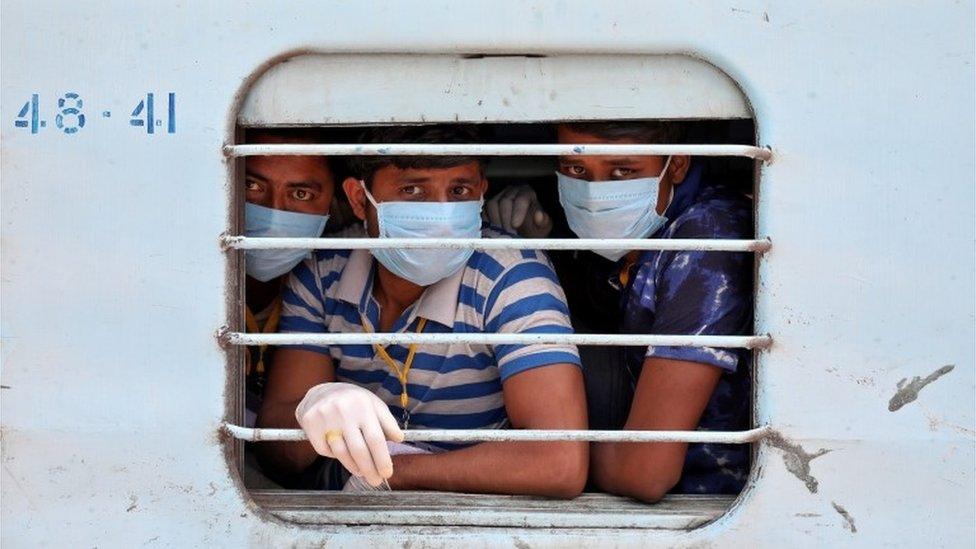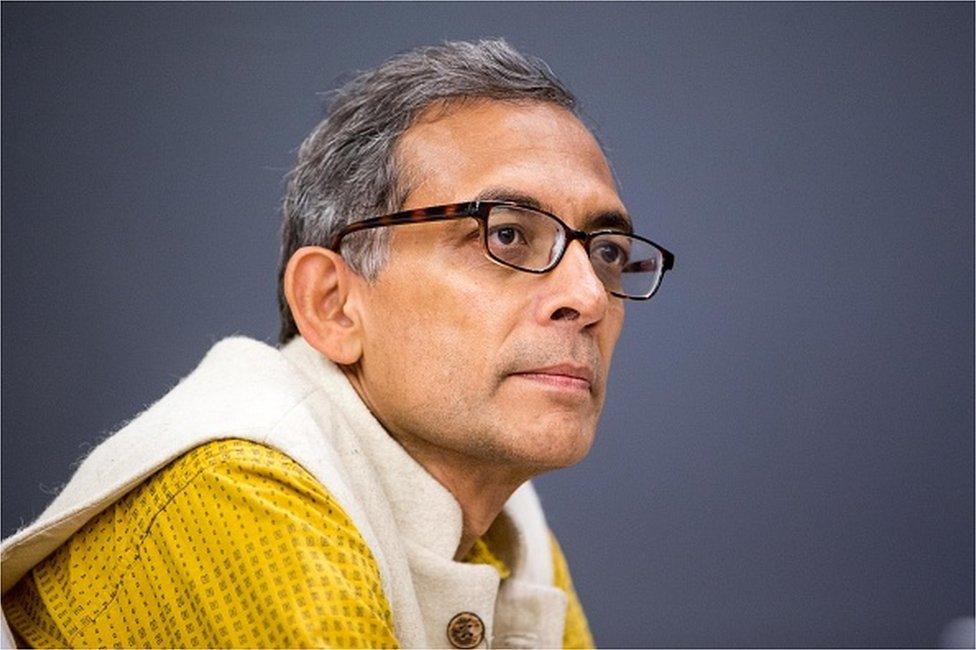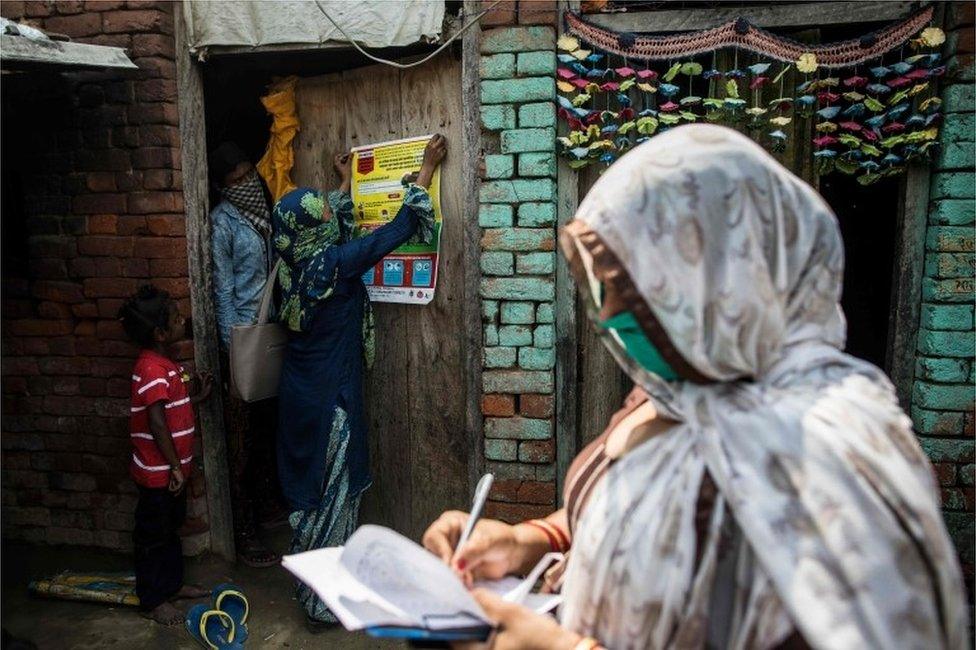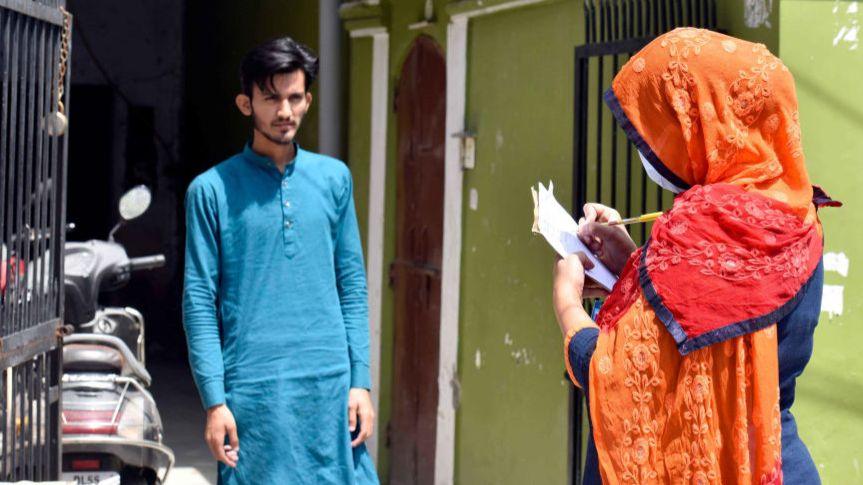India coronavirus: Videos by Nobel laureate help fight pandemic
- Published

In a video message recorded in early May, a Nobel Prize winning economist exhorted millions of people living in India's villages to take precautions to prevent the spread of the novel coronavirus.
"Keep away from crowds, maintain social distancing when meeting people. Don't spit in public. If you are coughing or sneezing use your elbow or a cloth or towel," Abhijit Banerjee, who won the Nobel prize last year, says in a calm and measured tone. He is a professor of economics at the Massachusetts Institute of Technology (MIT).
"If you have cough and fever it doesn't mean you have the infection. But report your symptoms to frontline health workers. We will win this battle but it will take time."
Prof Banerjee, who is a respected public figure in his native West Bengal state, recorded eight such 2.5 minute-long public health video messages in the Bengali language from his Massachusetts home. More than two-thirds of West Bengal's 91 million people live in villages. Using the services of a major telecoms provider, he and a team of researchers from the US and India sent text messages linked to the videos to 25 million people in the state in early May.
This was not the first time Indians had received public health messages on the pandemic. By the end of March, TV, radio and public signs were spreading information, and caller tunes of mobile phones had been replaced by spirited public health messages. Celebrities were talking about the disease on news networks. People received and shared over messaging services and social media what was often less than authentic information about the disease.
But the messages Prof Banerjee and his colleagues sent were part of a randomised controlled trial led by him with researchers from MIT, Harvard University and Stanford University. The trial split people into two randomly selected groups, one receiving the message that researchers were testing, and the other receiving standard government messages on the pandemic.

Abhijit Banerjee won the Nobel Prize in 2019
The study was aimed at examining the role of these messages in inducing behavioural changes among the recipients during a lockdown to prevent the spread of Covid-19. Would they obey stay-at-home orders? Would they socially distance during interactions? How often did they wash their hands upon returning home or wear masks when leaving home?
What the researchers found offered a fascinating insight into the limitations of official messaging and the promise of pithy messaging by a respected public figure in a country with more than 900,000 reported infections, the third highest in the world.
In West Bengal, 37% of the respondents in the control group receiving the government messages left their villages at least once in two days despite the lockdown. They reported that villagers were typically washing their hands only about 68% of the time on returning home. "This suggests that the Indian government's public health messaging was either ignored, forgotten, misunderstood or insufficiently disseminated within the community," the researchers wrote in the paper, external published by the Massachusetts-based National Bureau of Economic Research.
So would messaging by a well-known personality or a celebrity work better? Previous research using Twitter in Indonesia showed that messaging by celebrities worked better for higher vaccination outcomes. The value, researchers noted, was coming from a celebrity's voice rather than from the ministry of health.
As it happens, in this case, messages by a locally well-known academic appeared to have worked better than government messages.

Villagers reporting symptoms to health workers doubled, the study found
Dr Banerjee's widely disseminated video messages helped doubled the reporting of health symptoms to community health workers for fever and respiratory diseases, decreased travel beyond one's village, increased hand washing and wearing of masks.
This study in public health messaging proves that messaging by a well-known academic can work as well as Bollywood stars and cricket stars in a movie mad and cricket crazy country like India. "We had a lot of debates about who would voice the message. We decided on a Nobel winning academic because we felt he would have an impact because he was held in high esteem, not usually visible in the media, and was clear and spontaneous in his thoughts," Abhijit Chowdhury of the John C Martin Centre for Liver Research and Innovations, and one of the authors of the study, told me.
What this also possibly proves is that despite the avalanche of Covid-related information, the quality and length of the message matters. Also, most importantly, people need a nudge - tiny prompts that can alter behaviour and may help them to exercise better self-control - to pay more attention to calm persuasion.

A SIMPLE GUIDE: How do I protect myself?
VACCINE: How close are we to finding one?
AVOIDING CONTACT: The rules on self-isolation and exercise
LOOK-UP TOOL: Check cases in your area
TESTING: Can I get tested for coronavirus?

- Published15 June 2020
- Published17 April 2020

